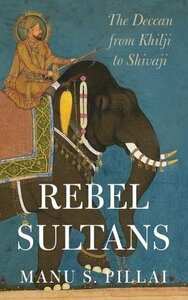Take a photo of a barcode or cover
..... 'between 1339 and 1347, two families of obscure or humble origins, operating on opposite sides of the Krishna River, led movements that radically redrew the Deccan's political, and more importantly, conceptual map. The Tughluqs had shattered the south and vanquished its old houses. And from the doldrums emerged Vijayanagar and the Bahmani Sultanate that, for reasons of economics cloaked in a language of religion, waged war against one another till nothing but ashes remained.
Let's be honest, history in India is very convoluted. It has been bent to meet political needs, modified to make certain people look like 'foreigners' and over all, there's a very black and white picture of the whole medieval portion of Indian history, especially, Deccan history.
This book talks about all the events that transpired in the Deccan through a bird's eye view. A lot has been covered in the 221 page read, the rest of the 75 pages being being notes and bibliography, detailing every page and book the author used to write the book.
Going into this book, I didn't know what to expect, because it is a history textbook with facts detailed in every page (hence the four stars), but coming out of it you'll realise how little in general do we know about history and how do people manipulate it for us to create a grave divide.
It's a good, eye-opening, history textbook, that should be taught in schools.
Let's be honest, history in India is very convoluted. It has been bent to meet political needs, modified to make certain people look like 'foreigners' and over all, there's a very black and white picture of the whole medieval portion of Indian history, especially, Deccan history.
This book talks about all the events that transpired in the Deccan through a bird's eye view. A lot has been covered in the 221 page read, the rest of the 75 pages being being notes and bibliography, detailing every page and book the author used to write the book.
Going into this book, I didn't know what to expect, because it is a history textbook with facts detailed in every page (hence the four stars), but coming out of it you'll realise how little in general do we know about history and how do people manipulate it for us to create a grave divide.
It's a good, eye-opening, history textbook, that should be taught in schools.
"Where once a great city stood, ruins would come to be, and as a traveller wrote dejectedly, the whole place was finally 'emptie' with nothing dwelling there 'but Tygres and other wild beasts'"
'Rebel Sultans' is a brief account of history spread over seven centuries fitted into 200+ pages. Just like the book describes; 'from Khilji to Shivaji'. It focuses on Deccan rulers and their 'interactions' with the sultans in Delhi, thus distinguishing it from most other books on history.
You might ask: isn't that just like every history textbook we read? Well, yes and no. This book tries to get some humor into the gruesome acts of war, which I felt was like standing in a battlefield and laughing while an elephant was charging towards me. But I'm don't denying that it did make the book a fun read. Another aspect I loved about the book was that it humanizes our kings of yore by expressing their pride and ego.
This is not a light read! But it has the potential to make serial history haters actually like the subject.
'Rebel Sultans' is a brief account of history spread over seven centuries fitted into 200+ pages. Just like the book describes; 'from Khilji to Shivaji'. It focuses on Deccan rulers and their 'interactions' with the sultans in Delhi, thus distinguishing it from most other books on history.
You might ask: isn't that just like every history textbook we read? Well, yes and no. This book tries to get some humor into the gruesome acts of war, which I felt was like standing in a battlefield and laughing while an elephant was charging towards me. But I'm don't denying that it did make the book a fun read. Another aspect I loved about the book was that it humanizes our kings of yore by expressing their pride and ego.
This is not a light read! But it has the potential to make serial history haters actually like the subject.
while I enjoyed reading this book, I walked away unsated. The problem I think is that the scope is so wide that the author has not time to add nuance to narrative of any period. By the time I was done reading the whole book, I was left with no real feeling of a change in my perception of the Deccan. Something I honestly expected to happen when I picked up the book. Another disappointment was that I expected Shivaji and Marathas to appear a bit earlier then the epilogue. although it is understandable that they only appeared at the closing of an age in the Deccan.
having said all that it is still a commendable effort and histories of the Deccan are rare enough that I would recommend this as a read. It is only 200 odd pages of actual text and you can finish it over a weekend. At worst you will have a few interesting stories to tell about the Deccan at best may derive a new understanding of a very unique part of the world ( even if I myself did not)
having said all that it is still a commendable effort and histories of the Deccan are rare enough that I would recommend this as a read. It is only 200 odd pages of actual text and you can finish it over a weekend. At worst you will have a few interesting stories to tell about the Deccan at best may derive a new understanding of a very unique part of the world ( even if I myself did not)
Amazing Book with lots of Information about the Deccan's Past! Perfect pick for History Lovers!
Growing up in India, you are made to believe (thanks to the education system) that the grandest aspect of Indian History was the Mughal Empire. Though true in it's time, it was not the only region, and empire that changed the course of history in India.
To remind us of this and tell us the tales of Deccan India, is Rebel Sultans by Manu S Pillai.
If all history books were written with such wit , humour and reason, history would be more accessible and enjoyable for all. Stretching from 1200s to 1700s, the books encompasses the story of Deccan India in it's prime.
A politically poignant read for today, the book logically explains with sufficient backing, how most of the renowned religious clashes and wars were more political than religious. It educates us about the culture of the Deccan and the Persian influence on art, architecture and cuisine.
The book illustrates how the Deccan was truly a space for cultural and religious assimilation. The shrewed and sometimes unfortunate decisions that led to large scale changes in the region, the hilarious and pride driven demands of the Sultans, the secret conversions, the contribution to art and literature, the wealth of the region, are all aspects of the book.
I cannot stress how important this book is, in the wide range of literature written about India and it's history over the years.
Its looks at the region's history with the most objective lens possible. A lens we to have forgotten to use in popular and political discourse today.
Giving credit to their poetic prowess, the author does not shy away from pointing out poetic exaggeration as compared to facts. It is very difficult to string together an objective picture in history. But this work clearly reflects the amount of research and effort that has gone into bringing this book together. Manu Pillai has unearthed an almost forgotten part of India and it's history.
To remind us of this and tell us the tales of Deccan India, is Rebel Sultans by Manu S Pillai.
If all history books were written with such wit , humour and reason, history would be more accessible and enjoyable for all. Stretching from 1200s to 1700s, the books encompasses the story of Deccan India in it's prime.
A politically poignant read for today, the book logically explains with sufficient backing, how most of the renowned religious clashes and wars were more political than religious. It educates us about the culture of the Deccan and the Persian influence on art, architecture and cuisine.
The book illustrates how the Deccan was truly a space for cultural and religious assimilation. The shrewed and sometimes unfortunate decisions that led to large scale changes in the region, the hilarious and pride driven demands of the Sultans, the secret conversions, the contribution to art and literature, the wealth of the region, are all aspects of the book.
I cannot stress how important this book is, in the wide range of literature written about India and it's history over the years.
Its looks at the region's history with the most objective lens possible. A lens we to have forgotten to use in popular and political discourse today.
Giving credit to their poetic prowess, the author does not shy away from pointing out poetic exaggeration as compared to facts. It is very difficult to string together an objective picture in history. But this work clearly reflects the amount of research and effort that has gone into bringing this book together. Manu Pillai has unearthed an almost forgotten part of India and it's history.
3.5 stars
I'm not a person who loves non fiction, but the author does make the story interesting
I'm not a person who loves non fiction, but the author does make the story interesting




